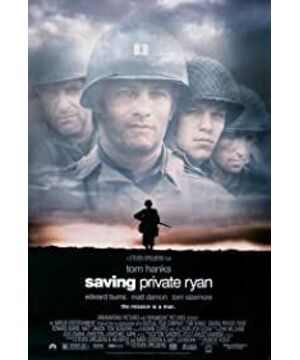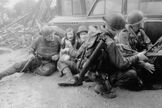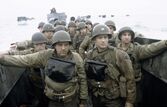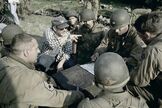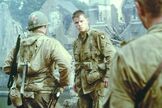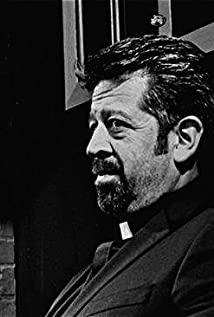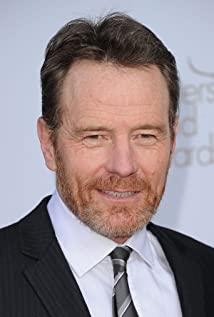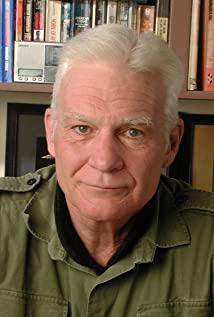Screenwriter||Comparison of the pros and cons of the film "Saving Private Ryan" and the script
2019-07-05 22:41
A senior screenwriter once said: Pulling films does not allow you to appreciate the beauty of flowers, but from a botanical perspective to insight into the structure of roots, stems, and leaves, and analyze the process of rooting, sprouting, and blooming. After finishing this homework, I felt like a savagely growing plant, rushing for a short while.
The prologue 00: 01 ~ 00: 42 length of 41 seconds-the national flag is flying, the black screen appears with subtitles, and the credits are presented. Then the American flag flew into the light.
1. 00:43~ 3 minutes 47 seconds and length 3 minutes and 14 seconds—— An old man in casual clothes walking on the road in the cemetery , followed by his wife, children and children. It can be seen that his family cares about him, and the eldest son even took pictures of his back. The old man walked into the cemetery. Rows of white crosses tombstones were engraved with names and dates. The old man walked to a tombstone and knelt down, sobbing in motion. The family quickly gathered around to comfort him.
[Comparative details 1] There is no opening part in the first draft of the movie.
2. 3 minutes and 48 seconds to 5 minutes and 35 seconds. Length: 1 minute and 45 seconds-Landing craft, soldier Obama Beach, and steel spurs. Subtitles: June 6, 1944.
The landing craft loaded with American soldiers rushed to the beach. The lead sergeant repeated the landing precautions loudly. The soldiers were very nervous. Some vomited and some prayed.
3. 5 minutes 36 seconds to 8 minutes 36 seconds length 3 minutes-the blood-stained coast landing craft ushered in fierce German artillery fire as soon as the door opened. . Miller commanded the soldiers to roll down the landing craft from the left and right sides. He dragged a soldier to the beach from the overhead water and was killed. The soldier was killed as soon as he said thank you.
[Comparative details 2]: The script also wrote that Miller drank a cigar to comfort the frightened recruits as if nothing had happened. It is not in the movie, and it seems to be inconsistent with the character. But when he was drinking with a kettle in his hand, he trembled violently from fear, which was specifically expressed in the script and the movie.
4. 8 minutes 37 seconds ~ 9 minutes 43 length 1 minute 6 seconds-silent horror
Miller fell into a silent trance (tinnitus). In the silence, he saw his comrades carrying a flamethrower being blown into a fire. He saw a soldier whose arms were broken and he lowered his head to find the stump below the elbow, as if he wanted to Find the military doctor to pick him up. I also saw that the entire landing craft was blown up on fire, and the firemen rushed down into the sea to put out the fire. He took out his helmet from the red sea water and buckled it on his head, and saw his subordinates yell at him, and the voice returned to normal from small to large.
[Detail comparison 3] The script did not fall into the silent tinnitus section. The director's treatment in this way highlights the cruelty of war and the impact on people's body and mind.
[Detail comparison 4] At the same time, in the script, the entire landing craft was blown up by artillery fire and mines in the sea, and the paragraph where gasoline floated on the water was changed to be bombed after landing, and the soldiers turned into firemen.
5. 9 minutes 44 seconds ~ 13 minutes 04 seconds length 3 minutes 20 seconds-Death Charge Captain Miller was awakened by the loud shouts of his soldiers and Sergeant Henry for instructions, and he immediately directed his brothers to attack the beach. He also charged all the way, leading the soldiers from the various units that had been disrupted to rush upwards-he told everyone that if they stay still, they will undoubtedly die. Stumped arms, caesarean bowel movements, and howling ghosts became the background for his charge.
[Detail comparison 5] He dragged a severely wounded soldier forward towards the medic. With a light in his hand, he looked back and saw that the wounded soldier was only left with a broken upper body. The performance of the battle is fierce and bloody to an unprecedented level. There is no such detail in the script. 6. 13 minutes 05 seconds ~ 14 minutes 11 seconds length 1 minute 06 seconds-a mess
Miller rushed to the beach and found that the formation of the landing force had been disrupted, the team was not under command, and the tanks did not wash up the beach. In the chaos, he asked the rifle soldier to report to his superiors, but found that the rifle soldier had been killed. Was also broken.
[Detail 6]: The two small soldiers nearby dug a shallower foxhole behind a shallow sand pile in the rain of bullets. Under the high pressure of war, people have unlimited possibilities.
7. 14 minutes 2 seconds to 17 minutes 36 seconds length 3 minutes 34 seconds-organize counterattack
Miller summoned his subordinates, including his right-hand man, Chief Sergeant Mike, and military doctor Wade, and ordered them to collect weapons and ammunition. He transferred a blasting tube, passed it up with his own hands, and blasted barriers such as barbed wire and landmines. After the blast, the sergeant began to call on everyone to counterattack.
[Comparative details 7] The large section from landing to counterattack is almost taken in the script. The director stretched it in the film and added countless close-ups of bloody flesh, broken limbs, broken arms, and broken stomachs. If it was to highlight the cruelty of the war, he undoubtedly did it, and he did it too much. Many shots are suspected of being repeated. is it necessary? The intestines have been broken repeatedly, and the flesh and blood is repeatedly blurred. It was a bit numb to see similar bloody shots later.
8. 17 minutes 37 seconds ~ 21 minutes 54 seconds length 4 minutes 35 seconds-open the breakthrough
Miller commanded his subordinates to launch an assault on the bunker, a batch of six rushed up, and after they were sacrificed, he ordered a sniper to rush into the crater and successfully killed the bunker to defend the enemy.
[Details] Miller used a bayonet and chewing gum to stick a small mirror to avoid bullets while observing the enemy's situation, once again adding a veteran aura to the protagonist. Take the lead to charge, you are courageous; Observation through oscilloscope, wisdom is also. The aura of wisdom and bravery strengthened.
[Details] A soldier still yelled at Miller, they didn't give us a chance to fight at all, it was unfair, the Germans were killing us! ——Naive, there is fairness in war.
[Comparative details 8] The script clearly stated that three groups of six-man death squads attacked the enemy bunker along the death trail and sacrificed one after another. It was also written about snipers, but the snipers only killed a few enemies. Later, Miller stepped forward and deliberately attracted the enemy’s machine guns. Two members of the death squad survived and threw deadly grenades at the bunker. Overcome this little natural danger.
The director's sacrifices to the three groups of death squads in the film did not seem to be very clear. The two groups of people who were confused (six each) passed, and there was no picture of their tragic sacrifices. Finally, let the sniper take down the bunker.
This arrangement is debatable. The previous "unconscious" sacrifices have been repeatedly emphasized, while the "intentional sacrifices" that hit the bunker have been hurriedly let go. Including the third wave of death squads, there is also a jealous New York guy Lebin, who is still adamant with Miller before the charge: "Can you transfer me away?" Miller replied: " OK, go to the top of the mountain to go through the formalities with me."
There are also the details of Miller stepping up to attract the enemy's machine gun firepower. In the script, it is to protect the two comrades who are about to be killed by the machine gun. In the film, it is to attract the enemy's attention and let the sniper charge up. In the former, Miller was far away from his comrades, which was reasonable; and letting the sniper jump out was actually very problematic. The bullet hit the sniper who just jumped out just one meter away. The director's change made bravery almost into a foolishness-a great director like Director Lien also sometimes changed the script! ! !
And the deliberate bravery and sacrifice can better reflect the cruelty of war? ! Is it because Steward did not want to express heroism with a strong sense of form? It shouldn't be. The Miller pistol behind the tank is also very formal. It is a pity that these brilliant details have been deleted by the director.
It is understandable to highlight the sniper. The young man has a lot of scenes and is a more brilliant role. At first, he was allowed to "save the cat" without any problems.
[Comparative details 9] There are also scenes of live surgery, blood flowing in a river, and prayers with the military priest. To be honest, it is a bit redundant, repetitive, and suspicion of slowing the rhythm. Instead, the script is more restrained and efficient in terms of bloody shots.
[Comparative details 10] What the script did not say, but the film shows the chaplain, a Buddhist soldier, and a sniper doing different religious prayers in succession. This series of prayers adds a religious ethereal to the battlefield and makes the audience feel right. The character has a sympathetic resonance. This is indeed the realm where the director is higher than the screenwriter-the director wins one point.
9. 2 1 minute 54 seconds to 26 minutes 45 seconds length 4 minutes 51 seconds-successful landing Miller led a team to attack the German position, shot the German army unwilling to fight, ordered flamethrower soldiers to burn the bunker, and finally occupied the position.
Easter egg 1: His little dragon set back then is now super 8 now.
[Details] Ten people shot a machine gunner who was shot down by a sniper into a sieve, and the flame-sprayed Germans came out of the bunker. The American soldiers below yelled: Don't shoot-let them suffer more. The German army who had clearly surrendered was shot and killed by the American army with a smile, and the German army who had fled in the trenches was shot and killed by platoon guns. It's no wonder that these German soldiers stained Normandy with blood and left countless comrades in arms and brothers tragically wounded. I can't kill it if I change it. So Miller didn't stop or reprimand the soldiers full of revenge and anger...Wait, is it possible that this is the director's over-exaggeration of the bloody meaning? ——Because of the heavy losses, the revenge is frantic, and the war has brought terror and trauma to both sides? This is a compassionate mind.
[Details] Sergeant Chief Mike grabbed the sand of Omaha Beach, put it into a small aluminum can, and put it in the bag. There are also seven or eight small aluminum cans in the bag, each with the words France, Africa, Italy and other places...the veterans who have been on the battlefield want to take home the memorial of the Southern and Northern Wars.
And after the battle, Miller's hand holding the water bottle trembling again (reappears), including the crying but tears of the Jewish soldiers after taking Hitler's knife, are all a kind of human emotional "saving the cat". It will give the audience more sympathy and attention to this role.
[Comparative details 11] The ninth scene from the capture of the bunker to the end of the battle is not in the script. The director added well.
10. 26 minutes 45 seconds ~ 27 minutes 50 seconds length 3 minutes-sacrificed RYEN
The panoramic camera swept across the beach, with corpses all over the field, and the blood washed over the corpses of the American soldiers (there are actually dead fish. Wouldn’t it be better if there was a live fish dying on the beach and dying beside the dead body?), and finally landed on A sacrificial soldier had the name RYEN printed on the backpack.
[Comparative details 12] This is a magical touch added by the director that is not in the script.
11. 27 minutes and 50 seconds to 29 minutes and 46 seconds, 1 minute and 16 seconds in length-three books of death
At a certain defense office in the United States, people came and went in a hurry, filled with a serious and busy wartime atmosphere. Accompanied by the narration of the notice of death, many professional women are typing in a notice of death with a typewriter. After an aunt behind a beautiful typist printed a notice, she seemed to have discovered something wrong, so she found the second copy and the third copy for comparison. After the comparison, she quickly walked into a young officer's office with three notices, let the officer watch it, and said something to the officer. The young officer showed a look of surprise, and immediately took her to the office of a middle-aged bald officer who was obviously higher in rank.
12. 29 minutes 46 seconds ~ 30 minutes 46 seconds length 1 minute-the four brothers Ryan
Officer Xie Ding led the young officer to the colonel's office and reported to him that the three Ryan brothers had been killed. The family members would receive three notices of death at the same time, and the fourth child was parachuted in Normandy.
13. 30 minutes, 47 seconds to 32 minutes, 30 seconds, length of 1 minute and 43 seconds-the bad news arrived at home in the vast countryside like a landscape painting. In the house at the end of the road, a middle-aged housewife was doing housework. She caught a glimpse of a car approaching from a distance, so she greeted it uncomfortably. This is an American military vehicle with five stars printed on it. When the mother saw the officer and priest getting out of the car, she couldn't help but slumped on the ground.
[Details] Use the quiet and large rear home environment to set off the blood and fire on the front line, and the contrast is even greater.
[Comparative details 13] The script was the mother weeping, and the director let her sit on the ground-the director won.
14. 32 minutes, 31~35 minutes, 31 seconds, length 3 minutes and 17 seconds -decided to save the old Uncle Bai and take the Xieding officer to the Ministry of National Defense to report to General Marshall. The airborne division chief said that due to the chaos and errors of the airborne, Xiao Sirui could not be found. Well, if you send a squad to find him, you have to pass through the German defense zone, and all of them will die. Marshall read to the officers a letter from President Lincoln to a mother-all five of her children died in the Civil War. After reading it, he ordered the rescue of the only remaining Ryan.
[Comparative details 14]: The script did not recite the letter (it’s memorized later, apparently General Marshall reads this letter profusely) this paragraph added by the director should reflect the humanitarian tradition of the United States. But it seems that the extra points are limited.
Easter egg three: I can recognize that the silver-haired officer on the right has played a role in another classic American drama, even if he is an entry-level audience of American military film and television themes.
15. 35 minutes 32 seconds ~ 37 minutes 53 seconds length 2 minutes 21 seconds-the new task Miller reported to the regiment headquarters, received a difficult new task from the regiment commander.
[Comparative details 15] In the script, Miller and the team leader utterly ranted, saying that it was not worth sending in a small team to save a private soldier, and also tried to push this unlucky task to others (half-joking). It seems that the protagonist in the movie has been adjusted quite a bit-Miller in the script is more like a legendary veteran, a bit unruly, but absolutely defiant at critical moments. The Miller in the movie is low-key, unpretentious, but indifferent at all, and can be trusted. Probably also related to Forrest Gump's actor traits. It's hard to imagine Hanks' oily tune.
16 37 minutes 54 seconds ~ 41 minutes 04 seconds Length 3 minutes 10 seconds-Organization Ranger Miller told his partner Sergeant Chief Mike that he had taken a new mission and needed some manpower, so he went to find a clumsy translator who had no combat experience. The translator also emphasized that there are many German troops in the places to go.
[Comparison of details 16] The bridge section of their jeep commissioned by General Gavin (seemingly insinuating Button) was deleted from the movie. At the same time, Miller's company in the script was still in a state of receiving fire when receiving a new task.
The three small adjustments are irrelevant.
17. 41 minutes and 04 seconds to 45 minutes and 40 seconds. Length 4 minutes 34 seconds-The Exchange Rangers walked across the field. The translator wanted to get close to everyone, but was scolded and mocked by the veteran. Everyone started to complain that in order to save one person with eight lives, Miller answered very witty, and everyone admired him.
[Detail comparison 17]: The script Miller and his party drove in a jeep until the car was bombed; the head, translator and subordinates mentioned three times that Miller was awarded the Congressional Medal of Honor; the soldiers chatted with each other about their lives, and when it came to betting to see who could ask the rice Le’s mysterious life before joining the army (moved to the next paragraph); Miller also showed off his supernatural detection ability; during the period, he also emphasized the legendary character of his soldiers and soldiers (immortality-repeated use of his own life). Attract enemy firepower but unscathed, incredible detection ability, leadership) worship.
18. 44 minutes, 48 seconds to 49 minutes, 02 seconds, length of 3 minutes and 07 seconds-the joint heavy rain arrived, and Miller led his team to connect with the US military in the target area. Under the guidance of the friendly army, go to find Ryan.
19. 49 minutes 03 seconds ~ 57 minutes 00 seconds length 8 minutes 54 seconds- a French family in the ruins of a sniper battle will give them their youngest daughter. The bald soldier did not listen to Miller's order to pick up the girl, but was hit by a sniper. Your own sniper successfully implemented a counter-sniper attack. The bald soldier died stupidly, and Miller looked ruthlessly and pulled out his dog tag. The team started again.
[Comparative details 18] Put the interpreter and soldiers bet to guess Miller's origins in this paragraph.
[Comparative details 19] The script did not have the French people hand over the little girl, which led to the sacrifice of the bald soldier. After hearing from the friendly army that there was a sniper on the opposite side, the sniper directly fired a gun to kill the German sniper. Obviously, arranging to save the little girl in the rain caused the bald soldier to be sniped, which triggered a more exciting scene of the most classic sniper in the history of the movie.
20. 57 minutes and 01 seconds to 59 minutes and 34 seconds, 5 minutes and 33 seconds in length-assault on friendly forces and lead them to find the position of Captain Hammill. A wall was accidentally collapsed. Behind the wall was a room of German troops. When the confrontation with guns on both sides was highly tense, Captain Hammill suddenly appeared from the second floor where he was, and shot and killed the German troops on the opposite side.
[Comparative details 20] There is no such bridge in the script, and the director added it, making the meeting between Miller and Hammill more dramatic, reflecting the impermanence of the war, and looking very cool.
21. 59 minutes and 35 seconds to 1 hour, 04 minutes and 45 seconds. Length: 5 minutes and 10 seconds- he admitted the wrong person, Captain Hammill recruited Ryan from his department, but found that his brother was still in middle school-the wrong person was found. Although Captain Hammill really needed them, he still sincerely told Miller to find Ryan and take him home. Exhausted, they found a ruined church to rest for a while.
[Detail Comparison 21]: The script did not find the wrong person. After the director added it, it means more troublesome things.
22. 1 hour, 4 minutes, 46 seconds to 1 hour, 12 minutes, 58 seconds, length 8 minutes, 12 seconds-church
Many candles are lit in the church, giving it a religious atmosphere. The exhausted soldiers found a place to rest one after another. Miller and Mike talked about a very funny warrior, and talked about other warriors who died in action. Miller said emotionally that every time he sacrificed a comrade in arms, he consoled himself that it would save more lives. His staff have been sacrificed by 94 brothers-he is not at all as ruthless on the surface, all of them are in his heart. Finally, he sighed and said that he hoped that Ryan was worthy of their salvation, and that he hoped that Ryan could save more people in the future, and that this trip would be worthwhile. Other comrades in arms also talked about their family and past lives.
[Detail comparison 22] The church was shaking hands again from the beginning. There is no script, and the trembling hand is magnified and repeated by the director into a small ailment. Give the protagonist a habitual label or defect in his words and deeds. Make him look more like a real person with flesh and blood flaws.
[Detail Comparison 23] In the movie, Miller even said: If Ryan can't save more people, then ten Ryans can't be worth a sacrificed bald soldier-life for life is really an immeasurable proposition. The director strengthened and clarified the moral issue of "Are human lives equal? Should eight lives be used to save one person", and even the protagonist questioned it. This is not achieved in the script.
[Detail Comparison 24] Here in the script, Mike saw that Miller had a lot of unopened family letters in his bag, and the two chatted a few words. Not in the movie.
23. 1 hour, 12 minutes, 59 seconds to 1 hour, 22 minutes, 35 seconds, length: 4 minutes, 37 seconds-accidental collision
They arrived at a gathering place for paratroopers and ran into a kind pilot who collected a pocket of dog tags for the fallen paratroopers. They laughed and searched for Ryan's dog tags on the side of the road, which attracted many The airborne soldiers' anger and dissatisfaction eyes didn't even notice Miller, and the medical soldiers hurriedly stopped when they found out.
Miller walked into the crowd and shouted, did anyone know Ryan? I really ran into a soldier who knew Ryan and got the information that Ryan was guarding the bridge somewhere.
[Details] The Jewish soldier stood on the roadside with his six-pointed star necklace to humiliate the German prisoners, telling everyone who passed by the prisoner his Jewish identity-it is not written in the script, it is indeed a scene that I remember every time I recall this film.
[Details] When Miller took the compass to analyze the map for the team members, his hands shook more severely. And everyone has seen it. He looked a little embarrassed, put away the compass and left.
[Detail Comparison 24] There are two major German forces in the script. With Miller's keen sense of smell, they were extremely thrilling and avoided the mortal fate - none of the movies were shot.
This is the largest part of the movie's screenplay deletion and modification. The result is that Miller’s legendary character in the script has been weakened. He learned insight and disguise from his mother, a super player; and Miller has nine lives, so he always tries his life, but he is always unscathed. There are three lives left; and after he lost his life to his teammates continuously, he found a place to be alone in the loss of life energy; the script also used a larger length to describe the dangers of two encounters with large German forces.
[Detail comparison 25] The director added Miller asked loudly in the crowd, and asked about Ryan's whereabouts by mistake. Intensified the contingency, and missed the chance to meet the German army. (These two paragraphs must be thrilling to be filmed. Later, two episodes of "Brothers" showed similar plots, which were produced by the director and Hanks. I don’t know if it was a supplement. regret)
[Detail Comparison 26] In the script, Miller's Rangers went directly to the bridgehead and found Ryan, who was in charge of guarding the bridge. It feels that the movie is more tortuous in the process of finding Ryan. So far, only half of the movie has been watched, and two-thirds of the script has passed.
24. 1 hour 22 minutes 36 seconds to 1 hour 23 minutes 40 seconds Length 1 minute 33 seconds-The machine gun position squad found the US military body near a hill, and then Miller found the machine gun position under the enemy's radar.
25. 1 hour 23 minutes 41 seconds length 1 hour 26 minutes 25 seconds length: 5 minutes 20 seconds -attack
Miller wanted to solve this machine gun position, and the three main soldiers in the team expressed opposition. But Miller insisted on attacking. The others had to keep up. Miller assigned the task, and everyone was ready to attack.
[Comparative details 27] In the script, New Yorker Lebin also suggested to bypass the machine gun position, but the director intensified this controversy in the film. On the one hand, it showed Miller's principle. When they met the 88mm cannon, some soldiers suggested to kill the cannon. Miller just called the air force to bomb, but did not accept his subordinate's suggestion. This was because he did not want to risk the life of his subordinates. Why did Miller insist on taking the machine gun position here?
In both the script and the movie, Miller gave a clear answer—because the Air Force did not return to bomb a machine gun position. If they don't solve it, it is likely that more American soldiers will die (like the fallen paratroopers they found). This is Miller’s principle. Does unpredictable risk and possible sacrifice mean that more lives can be saved? If so, then do it, and take the lead. If you don't have to sacrifice, let the Air Force do it.
There was also a thrilling golden line (added by the director). The Jewish soldiers said that this machine gun position was not our mission. Miller replied: Our mission is to win the war!
26. 1 hour, 26 minutes, 25 seconds to 1 hour, 27 minutes, 50 seconds, length: 1 minute, 25 seconds-win the position
The interpreter was in the back as instructed, holding a telescope and looking at them to take the position. Miller’s voice came from above, asking the interpreter to get a first aid kit and water quickly. It was obvious that someone was injured.
[Comparative details 28] In the script, a translator competed with a soldier to charge. The translator said that he had a speed of 24.5 seconds per 100 meters, and the blaster said he had a speed of 100 meters for 22 seconds. As a result, he lied and asked for Ren Deren's sacrifice. But the movie didn't make it like that.
27. 1 hour, 27 minutes, 51 seconds to 1 hour, 31 minutes, 25 length, 3 minutes, 34 seconds-the sacrifice of a military doctor
The translator rushed up with his bag, and saw the medical soldier shot in the abdomen, bleeding from it. It hurts so much that I can't speak, calling my mother to die.
[Detail comparison 29] Playing two morphines in a row means letting the injured die without pain. The second morphine in the script hits the bomber's brain directly (there does not seem to be the role of the bomber in the movie). In the movie, the medical soldiers asked their comrades to give themselves two morphines, which is equivalent to asking for euthanasia-even more sorrowful.
28. 1 hour, 31 minutes, 26 seconds to 1 hour, 33 minutes, 08 length, 1 minute, 52 seconds—captives dig graves
The comrades furiously punched and kicked the only remaining captive and killed him to avenge the medics. Miller asked the captives to dig graves for the medics and paratroopers. The interpreter told Miller that it was a big mistake to kill the captives. Miller was undecided.
29. 1 hour 33 minutes 09 ~ 1 hour 34 minutes 50 seconds Length 1 minute 10 seconds-sobbing
[Detail comparison 30] In the script, Mike came to comfort him. The two had a conversation with a philosophy of survival. They talked about sacrificed comrades in arms, and talked about how Miller learned from the mother of the winning player to pretend and be insightful. Speaking of shaking hands, and talking about the relationship between firepower and morale.
Compared with the script, making Miller cry alone is the end, but the layout of the script may have a better sense of rhythm, more depth and intriguing.
30. 1 hour 34 minutes 51 seconds ~ 1 hour 37 minutes 24 seconds Length 2 minutes 33 seconds-release
The soldiers came over aggressively and wanted to kill the captives (the captives chatted with the kind interpreter during the digging of the pit), and the captives tried their best to survive. Miller blindfolded him and ordered him to surrender to the American army on his own.
[Comparative details 31] There is no way to capture the German troops in the script—all were killed. The director joins here, triggering a conflict of "kill or release", which greatly intensified the conflict between Commander Miller (and Mike) and ordinary soldiers. Make the theme more distinct, prominent, and strengthened-in extreme wars, how can life and death be considered fair and just?
I have to say that this is where the director surpassed the script, including the prisoners who were released and took up weapons, not only to fight against them, but also to kill the Jewish soldiers and Miller with his own hands. This kind of serial handwriting made out of nothing is saving Ryan. The main line derives another branch line with profound meaning and controversy out of thin air. This may be one of the director's most successful and important adaptations of the film, greatly expanding the depth and focus of the film. Applause is hereby offered!
31. 1 hour 37 minutes 25 seconds ~ 1 hour 43 minutes 22 seconds length 5 minutes 57 seconds-Miller's secret
Miller let go of the prisoners, making the soldiers headed by Lebin extremely upset. Lebin directly said that this was an idiot's approach, and simply wanted to withdraw from the operation. Seeing that he resisted the order, Mike drew a gun and threatened him to return to the team. When the two yelled and confronted each other, the others were in a mess. Seeing that the Rush is about to happen, Miller suddenly asked how many people had guessed his origin bet? After attracting everyone's attention, he whispered about his life experience and eased the atmosphere of rattling swords. Finally, Miller told Lebin that if he wanted to leave, he would not stop him, and could even provide him with an application.
After talking about Miller going to bury the bodies of his comrades on his own, everyone followed up to help-including Leibin who was going to leave.
[Comparative details 32] After the battle in the script, everyone was depressed because they sacrificed a comrade in arms. After talking with Mike, Miller took a moment to relax and ordered the soldiers to go. There is no strong backlash in the movie. Miller in the script is obviously much tougher than Miller in the movie. If someone resists the order in the script, it must be Miller himself who threatened with the gun.
The director's handling made the "officers and soldiers" and the two values violently opposed, and directly rose to the height of life and death. He raised questions with incomparable honesty and bravery, and grabbed the hearts of the audience.
32. 1 hour, 43 minutes, 22 seconds to 1 hour, 46 minutes, 00 seconds, 2 minutes and 48 seconds in length-Battle meets Ryan
The team traversed the field full of yellow wildflowers, and everyone looked exhausted, physically and mentally, and still in a state of perseverance. The Jewish soldiers chanted an unknown ballad in a low voice. Suddenly Miller noticed the approaching enemy tanks, and quickly ordered everyone to lie down and hide. A German armored vehicle drove over and was ambushed by an unknown friendly army. After Miller led a squad to kill the Germans at the same time, three soldiers from the 101st Airborne Division stood out from the hidden grass. Among them, the handsome guy who blasted the armored vehicle with a rocket launcher was exactly the Ryan they couldn't find.
[Comparative details 33] In the script, Miller and his party went directly to the bridgehead guarded by Ryan, and found Ryan after rushing through the enemy's fire blockade. In the movie, it is arranged to encounter Ryan in a small battle, and there is a meaning of "breaking through iron shoes, nowhere to find, no effort to get it." At the same time, Ryan is able to bombard the enemy's armored vehicle, which is also Ryan. Entered the stage heroically in the way of "saving the cat". I feel that the performance in the movie is a little better.
33. 1 hour 46 minutes 00 seconds ~ 1 hour 51 minutes 26 seconds length 5 minutes 26 seconds-Ryan refused to leave
Miller, Ryan and his comrades came to the bridgehead they guarded. The entire town has been destroyed by artillery fire, and its walls are ruined. Miller announced the order to take Ryan home, but Ryan insisted on holding the ground with his brothers and refused to leave with Miller.
[Comparative details 34] In the script and the movie, Ryan insisted on staying and guarding the bridge with his brothers. The difference is that in the script, Miller started softly and comforted, but when the comfort was invalid, he was very annoyed and hurled at Ryan. At the same time, they also ordered other paratroopers to evacuate together (but the paratroopers know that this bridge is very important. If they fall into the hands of the Germans, the friendly forces will be in an ambush when they arrive and suffer heavy losses. Therefore, the paratroopers all expressed their intention to stay and resolutely complete the mission. Responsible).
In the script, Miller and the others met on the road with four Tiger tank enemies walking this way, so they knew that they would die if they stayed-in fact, this "knowingly stay and die" is a great setting, but unfortunately there is no such thing in the movie. use.
In the movie, Miller is relatively gentle, but Leibin tells Ryan that he has sacrificed two comrades in order to save him. And Miller asked Ryan, what would happen if you let your mother know that all four sons were killed? Ryan replied: My mother will understand why I stayed. This conversation is great. It is not in the script.
In the movie, Miller was rejected by Ryan on the grounds that he wanted to stick with his comrades in arms. He thought for a while, and then nodded again and again, as if he recognized Ryan’s choice and spirit. Well this kid is worthy of their rescue.
34. 1 hour 51 minutes 27 seconds ~ 1 hour 52 minutes 55 seconds length 1 minute 28 seconds-a dilemma
Miller and Mike discussed how to solve the problem by the river. Mike said he had two ideas, one was to leave Ryan alone. The other is to stay and stand firm with the paratroopers-to fight to return home.
[Comparative details 35] The script is Lebin taking the lead to indicate that he should stay, and the rest of the team also seconded. Miller emphasized that only he has the right to decide whether to go or stay (because he is the highest official on the scene, not a democratic vote), and everyone (including the paratroopers) immediately agreed with his right to decide. Then Miller voted the casting vote-stay and hold on! It seems that the writing of the script is more convincing than the two people discussing and deciding by the river. In particular, a thorn like Lebin also actively said that he should stay, and everyone else agrees to make the decision that they adhere to together appear to be more reasonable. Because it is a matter of life and death for everyone, letting everyone give their own attitudes and opinions will make the decision to stick to this decision more legally and rationally based, and thus will have a more united spirit and strength. This drama is even better.
35. 1 hour, 52 minutes, 55 seconds to 1 hour, 55 minutes, 45 seconds, length 2 minutes and 50 seconds-planning operations
Miller and others counted the few weapons and ammunition left with the paratroopers, then surveyed the battlefield and discussed and set up a battle plan together. Miller assigned tasks to everyone, and the soldiers carried out them separately.
[Comparative details 36] Unfortunately, the other members of the squad in the movie did not express any opinions about going to stay, even if it was a few complaints. The consistent style of the opponent) is very inconsistent. It can be regarded as the director's misstep. It is a pity.
36. 1 hour 55 minutes 45 seconds ~ 1 hour 59 minutes 00 seconds length 4 minutes 15 seconds-preparation
The soldiers unloaded a part of the TNT explosives they were going to use to blow the bridge and put them into socks to make sticky bombs; set up machine guns on the commanding heights; planted mines... Miller patrolled and corrected everyone’s preparations, to Bring Ryan everywhere. When Ryan asked about his mission, Miller told him: Follow me within two feet, no objections.
37. 1 hour 59 minutes 00 seconds ~ 2 hours 06 minutes 44 seconds Length 7 minutes 44 seconds-Rest before the war
[Detail comparison 37] In the script, Miller led someone to steal an 88mm artillery from the German position. There is no movie, it seems a bit exaggerated.
[Detail comparison 38] There is no dialogue between Miller and Ryan about the housework in the script. The director added such a small piece of thoughtfulness, as a peaceful foreshadowing before the final battle, with a degree of relaxation, which is quite good.
38. 2 hours, 06 minutes, 45 seconds to 2 hours, 10 minutes, 45 seconds, length 4 minutes, 00 seconds-the enemy is coming
There was movement from afar, and everyone found that the German army appeared, and they took up their weapons, entered the combat position, and were ready for battle. The sniper on the heights told Miller in sign language that the enemy was approaching two tanks, two armored vehicles, and a large wave of infantry. Miller photographed Lebin in a small tracked car as a bait, and the others waited.
[Detail Comparison 39] In the script, the sniper is in the bridge-keeper's hut, not on the top of the church. Although it is condescending and standing on the top, the target is too obvious and it is easy to be killed. There is also no plot of human bait and concocted sticky bombs in the script, but these have little effect on the plot.
39. 2 hours, 10 minutes, 45 seconds ~ 2 hours, 12 minutes, 37 seconds, length 1 minute, 52 seconds-the battle begins
Large waves of German infantry appeared accompanied by tanks and armored vehicles, and German soldiers even passed through the window where the US blaster was hiding, very nervous. The blaster detonated the mine at the right time, just in time to blow up a group of German troops following the tank. The battle has officially started.
40. 2 hours 12 minutes 38 seconds ~ 2 hours 34 minutes 38 seconds length 12 minutes 00 seconds-decisive battle
The German army relied on tanks, armored vehicles and superior forces to attack. Miller led his team to resist tenaciously, and the battle was extremely fierce. The members of the squad died heroically. Miller commanded the remaining few to withdraw to the last line of defense on the other side of the river. When they were about to blow the bridge, they were wounded by the gunfire of the Tiger tank and were hit by the German soldiers he let go. When the enemy was about to attack the last line of defense, US fighter jets rushed to blow up the tanks and then bombarded the infantry, defeating the German army. In the end, only Ryan, Lebin and the translator survived.
[Detail Comparison 40]: In the movie, after the sniper was placed on multiple enemy troops, after seeing the German armored gun aiming at him from the scope, the first thing he called out was to let his teammates be careful to hide! In the script, the sniper sniped the enemy in the bridgekeeper's hut. He also saw himself being targeted by artillery. He had a chance to escape, but he insisted on shooting until he died. Both are equally touching. But the film has a stronger sense of form and better-looking.
[Detail comparison 41]: Although the translator in the script has never participated in the battle, he was quite brave in the decisive battle and killed the enemy. Sacrificed the last time the ammunition was given to the machine gunner. The interpreter in the movie was scared and paralyzed in the fierce battle. He was dumbfounded on the stairs. The Jewish soldier was (the prisoner who was released by the translator). The German devil inserted the dagger into the heart during the hand-to-hand combat, and he couldn't even move forward. Rescue the comrades who are close at hand. The director's interpretation is more full-saying that being kind to the enemy is cruel to oneself.
And the prisoner-apparently a battle-tested veteran, after assassinating the Jewish soldier, went downstairs and passed through an interpreter who turned into a puddle of mud. The moment he turned a blind eye to him and disdain to kill was also very impressive.
The above is mainly because the plot to release this prisoner was buried in the front, and in the decisive battle later, it echoed in a cruel to shocking way, which fully demonstrated the cruelty of the war and the impermanence of fate. This more dramatic structure is indeed the work of everyone.
[Detail Comparison 42]: The biggest difference between the script and the movie in this decisive battle is that Miller, the protagonist in the script, survived almost unscathed. In the movie, he was made a glorious sacrifice, or he died under the captive gun he released. The translator saw this scene. So when the enemy retreated, the translator mustered up the courage to capture the fellow again and shot him (he was strongly opposed to killing him before), and avenged the Jewish soldiers and Miller.
[Detail Comparison 43]: The last savior in the script was not the bombers, but their tank divisions (they thought at first that the Germans had brought more tanks, first despair, then surprise). This classic scene later appeared in "Brothers".
[Detail comparison 44]: In the script, the young Ryan was always brave in the decisive battle (there is a detail that when a German army was about to shoot him, three comrades shot and killed the German army at the same time—showing everyone treated him In the movie, at the last minute, Miller once again lost his hearing and tinnitus. He saw Ryan, who was driven out of control by the frenzied fighting, clutching his ears and screaming loudly like a child.
[Detail comparison 45]: In the script, the last battle was fought twice, and the scene of talking about the family routine was put into the night after the first battle. Sergeant Mike died in the first battle, and the overall procrastination was relatively procrastinated. In the film, the director combined the two battles into one, and it was done in one go, which was obviously a successful adjustment.
41.2 hours, 34 minutes, 38 seconds to 2 hours, 34 minutes, 38 seconds, length 12 minutes, 00 seconds-sacrifice
Seeing that Miller was seriously injured and died, Lebin frantically looked for medical soldiers. The translator bowed his head and was speechless. Miller whispered to Ryan who was squatting in front of him: Don't let everyone down. After finishing speaking, he passed away quietly. The Chief of Staff Marshall’s narration sounded. It was a letter to Ryan’s mother to inform Ryan of the good news of returning home. After his death, he quoted President Lincoln’s famous article again. Ryan's young face instantly turned into an old look.
[Detail comparison 46] The noble sacrifice and the last entrustment made a moving climax. Every time I see this, tears will flow in my eyes. The director used the sacrifice of the protagonist to make the whole story get the final and best sublimation. It is indeed better than the script's relatively happy ending.
[Details] There was no crying hoarsely, everyone showed pain and sadness but restrained, only weeping silently.
42. 2 hours, 34 minutes, 38 seconds ~ 2 hours, 42 minutes, 04 seconds, length 2 minutes and 51 seconds-the end
The picture cuts back to the first scene, and Ryan, who has been in his sixties, mutters to himself in front of Miller's tomb. Tell Miller that he never forgot his last words on the bridge and that he worked hard to live a good life, hoping to live up to everything they did. When his wife came up, he deliberately asked his wife to say that he was a good person (this is a bit redundant, as if he is not confident enough to be a good person?). Finally he saluted Miller's tombstone and left with his family.
[Comparative details 47] The ending screen of the script shows the surviving Miller, Lebin, and Ryan, walking against the large group. As he walked, Miller told Ryan about the life experience and behavior of several sacrificed comrades. In contrast, the director's ending makes the whole story more complete. Where to start and where to end, it shows that the director is able to control the story with ease.
Summarize:
1. War films have fewer scenes than drama films, and there are nearly sixty scenes in total compared to "Shawshank" pull films. Because a battle may last for more than ten minutes, the film length is longer.
2. There are 47 obvious changes to the script by the director, which exceeds Shawshank's more than 30 changes. Most of the changes were successful, and the story was optimized, especially the two main events that caused the confrontation between the release of prisoners of war and the sacrifice of Miller at the end, which was very brilliant, at least 20 points were added. There are also a few that I think are inferior to the script, probably three to seven.
3. The director's changes are mainly in the following aspects:
1. Emphasize the theme: Is it fair to use the lives of several people to rescue a person (even if his three brothers have sacrificed) is fair, everyone’s lives are fair, who is not raised by the mother’s parents, on what basis? Take a risk and sacrifice alone? Even Miller and Ryan questioned themselves. This torture has been strengthened throughout.
Second, the intensification of contradictions, whether to attack the machine gun position, and whether to kill or release the prisoners has caused considerable controversy, and even caused a confrontation between Miller and his soldiers. From the conflict of values, to almost fighting each other.
View more about Saving Private Ryan reviews


